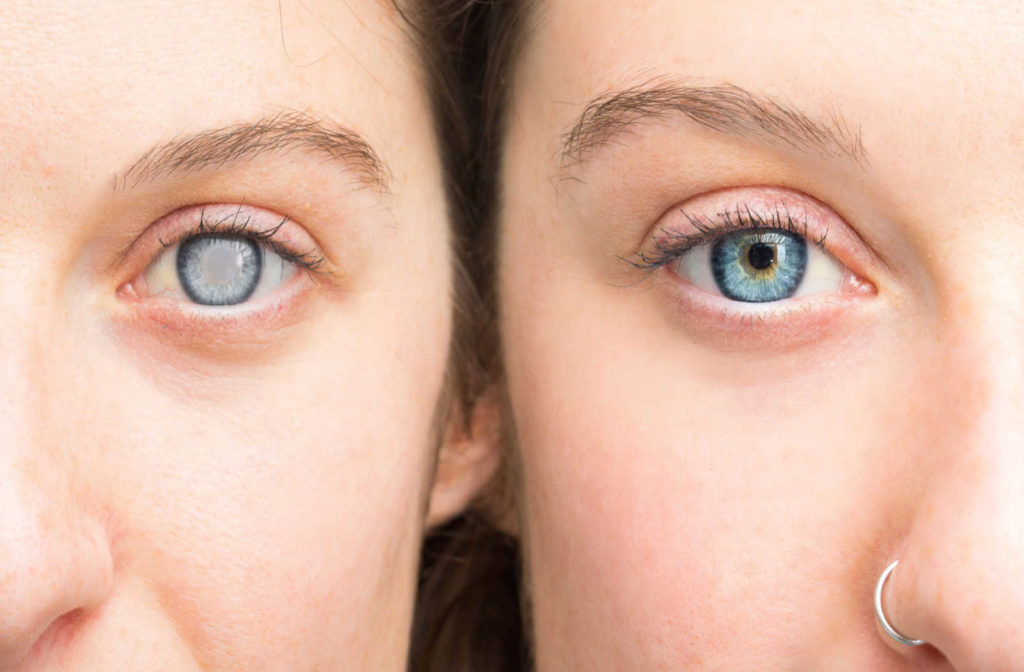Diabetes can affect several aspects of your health, including your vision. If you’re receiving an eye exam, can your eye doctor determine if you have diabetes?
Continue reading to learn more about diabetes, including if your eye doctor can identify it in an eye exam and how diabetes can affect your eye health.
Can an Eye Exam Identify If You Have Diabetes?
Yes, your eye doctor can identify and diagnose diabetes in a comprehensive eye exam. Your eye exam is more than an assessment of just how well you can see—your optometrist can identify several eye and health-related problems through their diagnostic tests. Diabetes affects your eyes, damaging the small blood vessels in your retina, an essential part of your vision.
Your eye doctor uses several diagnostic tools to assess your eye health during your exam, looking for early signs of problems within your eyes. They can identify diabetes when it damages the blood vessels in your retina, and refer you for annual diabetic eye exams.
How Does Diabetes Affect Your Eyes?
Diabetes affects how your body uses insulin, either not making enough or not using it effectively. When blood sugar rises, insulin typically helps lower it. If someone has diabetes, insulin doesn’t help control blood sugar.
High blood sugar for long periods of time can damage the eyes, leading to potential vision loss and an increased risk of eye disease.

Eye Conditions Related to Diabetes
Anyone with diabetes is at risk of diabetic eye disease, a general term to describe eye problems resulting from diabetes. Many of these conditions develop slowly and symptom-free, making regular eye exams crucial to identify these problems as early as possible.
You’re at risk of several eye conditions if you have diabetes, including glaucoma, cataracts, diabetic retinopathy, and diabetic macular edema.
Glaucoma
Glaucoma is a group of eye diseases that affect the optic nerve, an essential part of your vision. This disease can lead to severe vision loss if left untreated, but glaucoma tends to develop without symptoms until vision loss occurs.
Many forms of glaucoma lead to increased intraocular pressure, the fluid pressure in your eye. This increased pressure damages the optic nerve, leading to vision loss.
Many types of glaucoma exist, including:
Anyone can develop this disease, but your risk is higher with diabetes, doubling the chance you develop open-angle glaucoma.
Cataracts
A cataract clouds your eye’s lens, leading to eventual vision loss. This condition typically occurs due to age as the lens becomes thicker, less flexible, and opaque. Proteins and fibers in the lens break down and clump together, forming the cataract.
Cataracts progress with time until your vision is severely affected. Many people need cataract surgery to help them see clearly again.
While cataracts are a natural part of aging, diabetes can increase your risk. You may develop cataracts at a younger age if you have diabetes.
Diabetic Retinopathy
Diabetic retinopathy is a disease anyone with diabetes can develop. It develops due to high blood sugar damaging the blood vessels at the back of the retina, causing them to swell, break, and leak fluid. You may not notice diabetic retinopathy at first, but symptoms worsen as this disease progresses.
Later stages of diabetic retinopathy can lead to the development of scar tissue, an increased risk of retinal detachment, and increased eye pressure, putting you at risk of glaucoma.
Diabetic retinopathy is a serious risk of vision loss if you have diabetes, making treatment crucial for protecting your sight.
Diabetic Macular Edema
Diabetic macular edema is a complication of diabetic retinopathy. It occurs when leaking fluid in the retina from damaged blood vessels collects underneath your macula, a part of your retina necessary for central (straightforward) vision.
Swelling in the macula can affect your ability to see, leading to severe vision loss if left untreated.
With the risk these eye conditions present, it’s important to have your eye doctor complete regular comprehensive eye exams if you have diabetes.
The Importance of Regular Eye Exams If You Have Diabetes
Because of the damage diabetes can do to your eyes, it’s important to have consistent eye exams. Many eye conditions related to diabetes can develop without symptoms. Your eye doctor can identify these problems in your eye exam, noticing early signs of eye disease and changes in your vision.
You should visit your optometrist at least every year if you have diabetes.
Protect Your Eye Health & Vision
Diabetes can significantly affect your eye health, but your eye doctor is here to help. They can diagnose and treat eye-related problems, protecting your vision. Ensure you book your annual eye exam so they can care for your vision and eye health. Contact your optometrist at Dr. Bladh OD when it’s time for your next eye exam.



